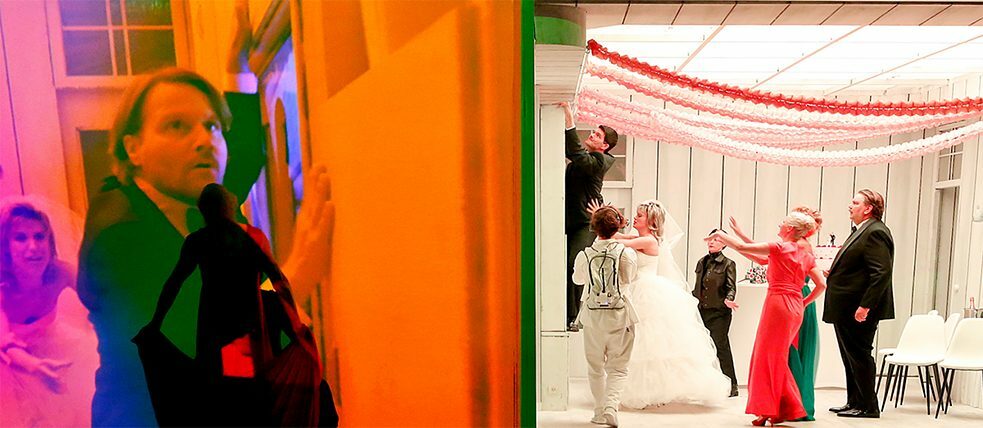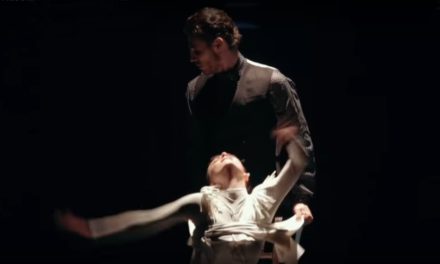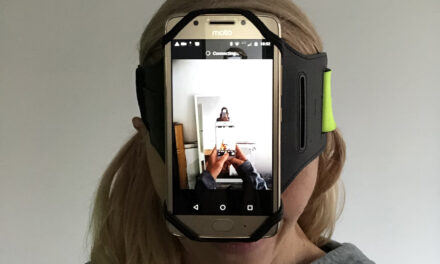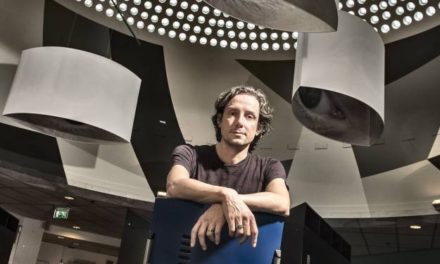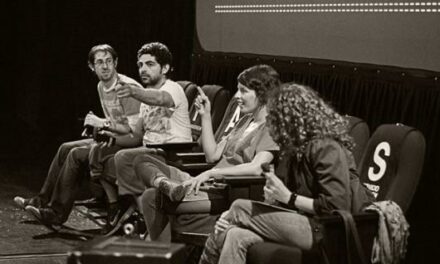Virtual reality, 3D animation, and robotics have long been used by theatre directors in other countries but they have yet to be embraced as tools of stagecraft in Germany. That is about to change. The new Akademie für Digitalität und Theater (Academy for Digitality and Theatre) in Dortmund is set to revolutionize the German theatrical landscape.
What if Fred’s life had taken a different course? In Die Parallelwelt (Parallel World), premiered in September 2018, that question is examined by two theatre companies simultaneously – in Berlin and Dortmund. Both tell the story of Fred’s life but they present different versions: the course of his life is determined by chance. The two theatres are connected by 420 kilometers of fiber-glass cable, permitting what happens on one stage to be transmitted live to the other theatre. The audience follows both stories at the same time – one enacted on stage, the other played out on a video screen.
The theatre is an analog medium but as Kay Voges’ Die Parallelwelt shows, it can be interwoven into virtual reality. The director’s digital stagecraft and experiments make him a pioneer in Germany – and he is well aware of that fact:
“By international standards, the German theatre landscape has quite a lot of catching up to do when it comes to digital innovation. In many countries, digital thinking plays a much more prominent role in the workings of theatre than here.”
http://https://www.youtube.com/watch?v=gNWfu8GEhek
Trailer of the Die Parallelwelt – Schauspiel Dortmund
Since Voges has been artistic director at Schauspiel Dortmund, an interdisciplinary team there has been looking into the opportunities presented by the digital revolution. Voges believes that is imperative if theatre is to remain relevant:
“I think it is fair to say that the transformation of society in the wake of digitalization is as sweeping as the changes brought about by the invention of the printing press. How can theatre reflect the problems and conflicts of contemporary society if it does not keep pace with that society’s development? It now takes more than the narrative techniques of the pre-digital age to portray the complexity of life.”
Training digitality for the theatre
But Voges knows from long experience what problems theatres face when it comes to digitalization. With a typical rehearsal cycle of six to eight weeks, there is hardly any time or money for real experimentation. There is also a shortage of skilled specialists in all areas, from virtual reality and motion capture to robotics and artificial intelligence – which is hardly surprising considering there have been no digital skill training programmes for the more than 40,000 people working in German theatre.
“A lighting engineer recruited as an electrician 25 years ago now sits at a console programming moving lights. And the sound engineer who used to play audio cassettes during a performance now also works at a computer.”
To bridge the gap between standard theatre practice and the possibilities offered by digital technologies, Voges and his team–after a three-year startup phase–have established the Akademie für Digitalität und Theater in Dortmund. In March 2019, it will run training programmes for theatre technicians and artists in conjunction with the professional association of German theatre technicians DTHG and the performing arts employers association Deutscher Bühnenverein. In addition to the general prospectus of courses, September 2019 will see the first year’s intake of scholarship‑holders embark on experimental artistic research projects. The academy will also one day run a degree program on media art and film in theatre–but Voges admits that is “still a long way off.”
Until the new premises in the Dortmund docklands are completed in 2020, the academy will use a provisional venue made available by Schauspiel Dortmund. The fact that Dortmund, of all places, should be establishing itself as a hotspot for theatre and digitality is due to the city’s history: the metropolitan area of the Ruhr looks back on 700 years of mining tradition, which came to an end with the closure of the last coal pit in 2018. Dortmund anticipated the radical changes that lay ahead and took early steps to secure its future, becoming the fifth-largest digital center in Germany.
Opportunity not threat
A foretaste of the endless possibilities created when digital technology and theatre come together was provided by the Enjoy Complexity conference organized by Voges and Schauspiel Dortmund to mark the establishment of the academy in spring 2018. Among other things, visitors have introduced to one of Voges’ virtual reality (VR) productions. Media designers had produced laser scans of the stage set for Die Borderline Prozession, made 360° videos of scenes from the production and combined them to create a work of VR theatre. Using a VR headset, the viewer is thrust right into the action, able to move freely around the stage and auditorium while the play runs its course.
However, the Akademie für Digitalität und Theater will not focus solely on technological possibilities. Voges also sees its mission as a political one – to examine issues such as visual manipulation, privacy, and social media.
“When I look at the political situation in Germany and Europe I see a reductive trend,” he explains. “Issues are simplified, portrayed as less complex than they really are. I regard that populism as a dangerous fear response to the globalisation and digitalisation of society. Theatre is a place where complexity can be seen as an opportunity, not a threat. Complexity is beauty.”
http://https://www.youtube.com/watch?v=iwbr3_mt6Vs
Trailer of the Memories Of Borderline
This article was originally published in Goethe Institut in February 2019 and is reposted with permission.
This post was written by the author in their personal capacity.The opinions expressed in this article are the author’s own and do not reflect the view of The Theatre Times, their staff or collaborators.
This post was written by Anja Quickert.
The views expressed here belong to the author and do not necessarily reflect our views and opinions.

